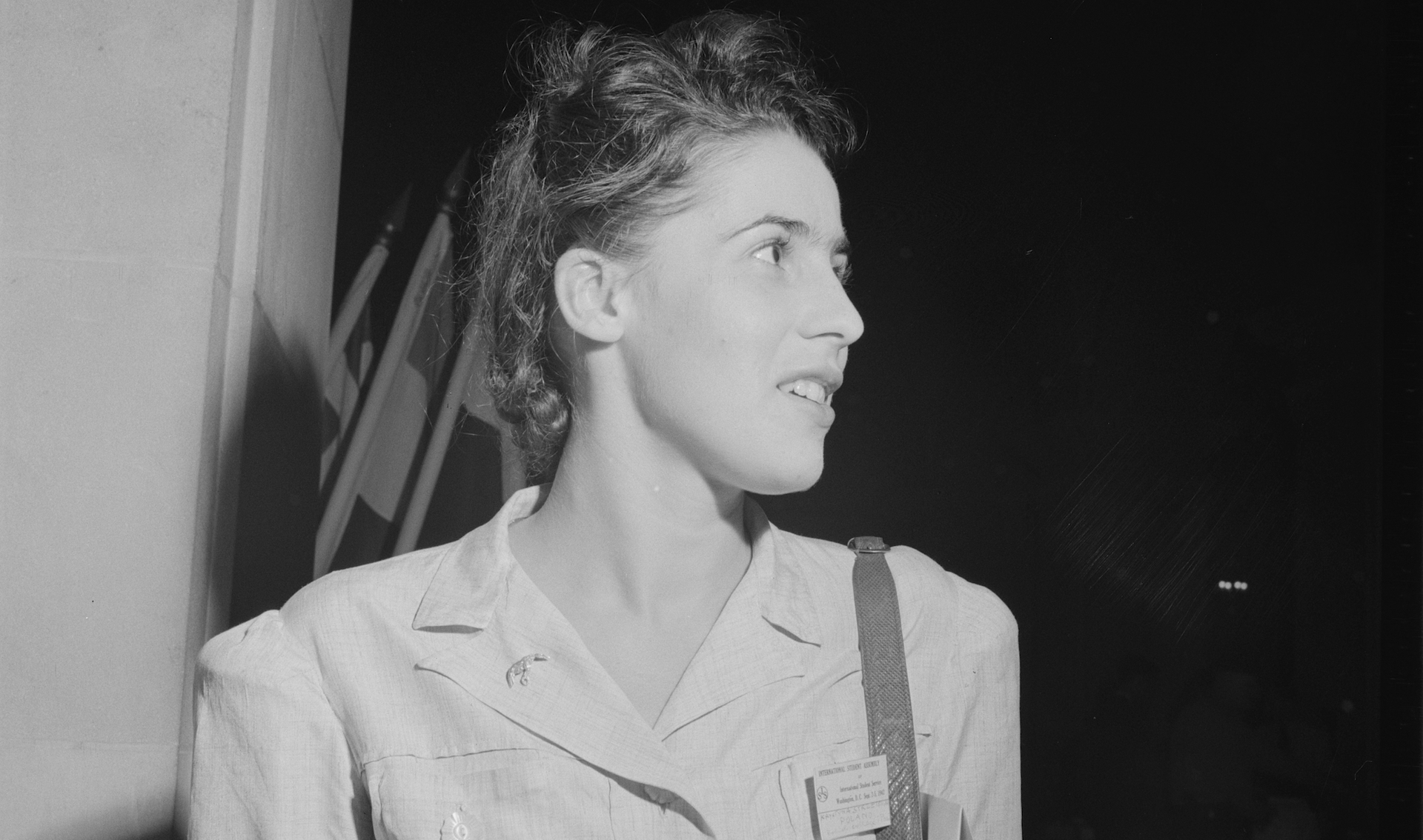A story about U.S. OWI and Voice of America (VOA) pro-Soviet propaganda originally published by the Online Cold War Radio Museum
Ted Lipien for Cold War Radio Museum
September 1, 2016
The Office of War Information (O.W.I.), established by Executive Order No. 9182 of June 13, 1942, was the WWII-era domestic and foreign propaganda agency of the U.S. Executive Branch reporting only to President Franklin Delano Roosevelt but essentially making its own decisions. The Voice of America, which belonged to the Office of War Information, originally did not have this name and was initially a propaganda outlet for the Franklin Delano Roosevelt administration, broadcasting anti-Nazi propaganda as well as propaganda in support of Stalin and the Soviet Union. Only a few years after the end of World War II, VOA started to criticize Soviet Russia and contributed, along with Radio Free Europe and Radio Liberty, to the eventual fall of the Soviet Union and its empire in Eastern Europe.
The names, “Voice of America” or “VOA,” were not commonly used during World War II. These overseas shortwave radio programs were then placed in the Overseas Branch of the O.W.I. and had different names, such as “America Calling Europe.” They were often referred to by O.W.I. senior managers and others as “propaganda” or “psychological warfare” broadcasts. Among its many propaganda activities in the United States, the O.W.I. produced pamphlets and films justifying the illegal internment camps for Americans of Japanese ancestry after the Japanese attack on Pearl Harbor.
The Office of War Information also engaged in often illegal censorship of some of the U.S. domestic media. The main targets of O.W.I.’s domestic censorship and intimidation were ethnic radio stations and newspapers in the United States.
Some Polish-American media reported on Soviet atrocities, such as the then-secret Soviet execution in 1940 of over 15,000 active and reserve Polish military officers who were taken prisoner by the Soviet NKVD security service in the autumn of 1939. These executions in the spring of 1940, collectively known as the Katyn massacre, resulted in 22,000 deaths of Polish officers, soldiers, and government officials and employees – many of the leading members of the Polish intellectual and political elite. O.W.I. also tried to censor media reports on Soviet arrests and deportations of millions of Polish citizens, Russians, Ukrainians, Lithuanians, Latvians, Estonians, Crimean Tatars, and others. These Soviet repressions resulted in mass starvation, illnesses, and countless deaths from executions, lack of medical care, and hard labor.
Facts relating to communist repressions in the Soviet Union were suppressed by the O.W.I. and in Voice of America broadcasts because Stalin became a U.S. ally against Germany after Hitler, Stalin’s former war ally, had attacked Soviet Russia in 1941. September 1 marks the anniversary of the outbreak of World War II in 1939 with Nazi Germany’s attack on Poland. It was followed by the occupation of eastern Poland by the Soviet Union. The Red Army invaded eastern Poland on September 17, 1939 under the terms of the secret protocol of the Molotov-Ribbentrop Pact, also known as the Hitler-Stalin Pact, signed in Moscow by Nazi Germany and Soviet Russia on August 23, 1939.
The refugee Polish students who attended the International Student Assembly in Washington, DC in September 1942 were recording radio programs for O.W.I./VOA most likely to offer what turned out to be a false hope of U.S. support for Poland’s independence after the war and possibly to encourage anti-Nazi resistance in German-occupied part of Poland.
In September 1942, when these interviews were recorded, the Soviet Union still maintained diplomatic relations with the Polish Government in Exile in London. The Polish Embassy in Washington was involved in facilitating the travel of the Polish students to Washington and their participation in the O.W.I-Voice of America programs.
The chief VOA English newsroom writer and editor in 1942 was American novelist Howard Fast. He received what he described as useful information from the Soviet Embassy in Washington and admitted to censoring any negative news about the Soviet Union, dismissing such news as “anti-Soviet propaganda.” In 1943, he formally joined the Communist Party U.S.A. and left his government O.W.I. job in January 1944. In 1953, Fast received the Stalin Peace Prize.
The most active Soviet agent in the O.W.I. revealed in the U.S. Venona project intercept of Soviet secret communications was Flora Wovschin, a senior research assistant in the O.W.I. Overseas Division library, which would have been also the Voice of America library and its research section. Mentioned in 20 deciphered KGB Venona cables, she was praised for her energy and dedication in providing information from the O.W.I. but eventually told to look for other U.S. government positions, where she could be more useful to the Soviet intelligence. She found a job at the State Department. Shortly after the war, she escaped to Russia. Other Soviet agents were Communist Party members employed in several of VOA’s foreign language services.[ref]Earl Haynes and Harvey Klehr, Venona: Decoding Soviet Espionage in America (New Haven and London: Yale University Press, 1999), pp. 198-201.[/ref]
After the Soviet Union broke diplomatic relations with the Polish Government in Exile in April 1943 following the German discovery of the graves of massacred Polish officers in the Katyn Forest, O.W.I. and its Voice of America broadcasters restricted their cooperation with the Polish Embassy in Washington and continued with the cover-up of Soviet atrocities. Despite evidence to the contrary and the urging from the U.S. State Department to exercise caution, VOA wartime broadcasters blamed the Katyn massacre squarely on the Germans. One of such broadcasts for U.S. and foreign audiences was written and recorded by the O.W.I. director, Elmer Davis. Some of the wartime O.W.I. Polish employees and VOA broadcasters were Communists and Soviet sympathizers, who after the war began working as propagandists for the Soviet-dominated communist regime in Poland.
When the young Polish students were interviewed or recorded their statements in Washington, the fate of the Polish officers murdered on the orders of Stalin and the Soviet Politburo was still a mystery. The Voice of America did not start to report more truthfully about Katyn until after the war, following the departure of some of the Soviet sympathizers and the cooling-off of U.S.-Soviet relations. Even then, VOA reports on the Katyn massacre were periodically censored, but not as fully as when VOA was part of the O.W.I. during the war. President Truman abolished the Office of War Information by Executive Order No. 9608 on August 31, 1945, and transferred the Voice of America to the State Department.
What happened to some of these Polish students after the war is not known. The vast majority of Polish refugees who found themselves in the West during the war did not return to communist-ruled Poland. The first name of the young woman in the photograph above is Krystyna, judging by the name tag she is wearing. Her last name cannot be fully deciphered, but it appears to start with “Strze.” The names of some of the students were misspelled in O.W.I. and Library of Congress records and captions.
Corporal Kazimierz Dziedzioch seen in some of the O.W.I. photographs was 15 years old in 1939, according to an article about him on the Polish Wikipedia. He escaped from Poland to the West and lied about his age to join the Polish Army in France. In 1940, he fought in Norway, where he was wounded by a German bomb. One of his legs was amputated above the knee. In 1942, he received the highest Norwegian military medal, Krigskorset med Sverd. The Polish Government in Exile sent him to the United States to recover his health, finish his education, and promote the cause of independent and democratic Poland. As a member of the propaganda unit of the Polish Army, he participated in several O.W.I./Voice of America radio programs. After the war, he remained in the United States, changed his name to Casimir D. Bernard, and worked for IBM. He died in New York in 2007.
President Roosevelt recorded a message in connection with the International Student Assembly and held a reception for the international students at the White House. The President’s statement would have disseminated by the O.W.I. overseas through the Voice of America programs, although officially they were not yet called Voice of America broadcasts.
One of the students President Roosevelt met was Corporal Dziedzioch. As reported by the Jewish Telegraphic Agency (JTA) on September 3, 1942, Nazi racial theories and the post-war status of Palestine were expected to be among the questions debated at the International Student Assembly which opened at American University in Washington, D.C. According to the JTA report, 28 nations were to be represented at the gathering by 300 students.
In his September 3, 1942 broadcast to the International Student Assembly, President Roosevelt said:
“In Norway and Holland, Belgium and France, Czechoslovakia and Poland, Serbia and Greece, there is a fighting spirit that defies the harsh oppression, the barbarous cruelty and terrorism of the Nazis. Although disarmed, the unconquerable people still strike at their oppressors. Although forbidden to know the truth, they listen at the risk of their lives to radio broadcasts from afar; and, by word of mouth and by secret newspaper passed from one patriot to another, they still spread the truth. When the time comes for these peoples to rise, Hitler’s New Order will be destroyed by the hands of its own victims. Today, the embattled youth of Russia and China are realizing a new individual dignity, casting off the last links of the ancient chains of imperial despotism which had bound them so long.”
In his speech, President Roosevelt also made a number of promises and predictions that turned out to be empty as a result of the agreements he and British Prime Minister Winston Churchill made later with Soviet dictator Joseph Stalin during their wartime conferences in Tehran and Yalta.
“This is a development of historic importance. It means that the old term, ‘Western Civilization,’ no longer applies. World events and the common needs of all humanity are joining the culture of Asia with the culture of Europe and of the Americas to form, for the first time, a real world civilization. In the concept of the Four Freedoms, in the basic principles of the Atlantic Charter, we have set for ourselves high goals, unlimited objectives. These concepts and these principles are designed to form a world in which men, women and children can live in freedom and in equity and, above all, without fear of the horrors of war. For no soldiers or sailors, in any of our forces today, would so willingly endure the rigors of battle if they thought that in another twenty years their own sons would be fighting still another war on distant deserts or seas or in far-away jungles or skies. We have profited by our past mistakes. This time we shall know how to make full use of victory. This time the achievements of our fighting forces will not be thrown away by political cynicism and timidity and incompetence. There is still a handful of men and women, in the United States and elsewhere, who mock and sneer at the Four Freedoms and the Atlantic Charter. They are few in number; but some of them have the financial power to give our enemies the false impression that they have a large following among our citizenry. They play petty politics in a world crisis. They fiddle with many sour notes while civilization burns. These puny prophets decry our determination to implement our high concepts and sound principles. And the words of these little men of little faith are quoted with gleeful approval by the press and radio of our enemies.”
Photos

Delano, Jack, photographer. Washington, D.C. International Youth Assembly. Delegate from Poland. Sept. 1942. Image. Retrieved from the Library of Congress, https://www.loc.gov/item/owi2001009820/PP/. (Accessed August 31, 2016.)
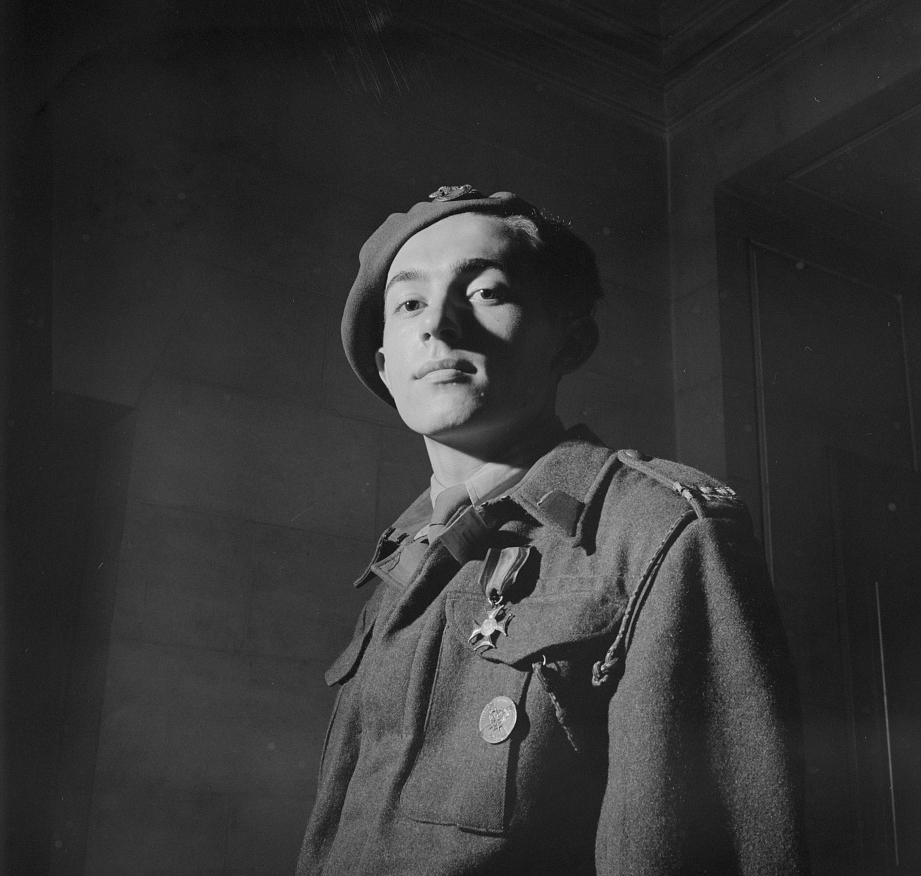
Delano, Jack, photographer. Washington, D.C. International Youth Assembly. Delegate from Poland. Sept. 1942. Image. Retrieved from the Library of Congress, https://www.loc.gov/item/owi2001009873/PP/. (Accessed August 31, 2016.)

Nichols, Dan, photographer. Washington, D.C. Foreign students at the International Student Assembly recording short talks in their native language to be broadcast by shortwave, after censorship by the OWI Office of War Information, to Nazi-held territory. Corporal Dziedzioch of Poland, eighteen years old. He spoke from the military standpoint. He lost his leg in the Narvik raid with the British and wears the decoration for heroism on his shoulder. Sept. 1942. Image. Retrieved from the Library of Congress, https://www.loc.gov/item/owi2001009762/PP/. (Accessed August 31, 2016.)

Nichols, Dan, photographer. Washington, D.C. Foreign students at the International Student Assembly recording short talks in their native language, to be broadcast by shortwave, after censorship by the Office of War Information OWI, to Nazi-held territory. Yolande Dankowier and Corporal Kazimierz Dziedzioch of Poland checking over their talks before recording. Sept, 1942. Image. Retrieved from the Library of Congress, https://www.loc.gov/item/owi2001009781/PP/. (Accessed August 31, 2016.)
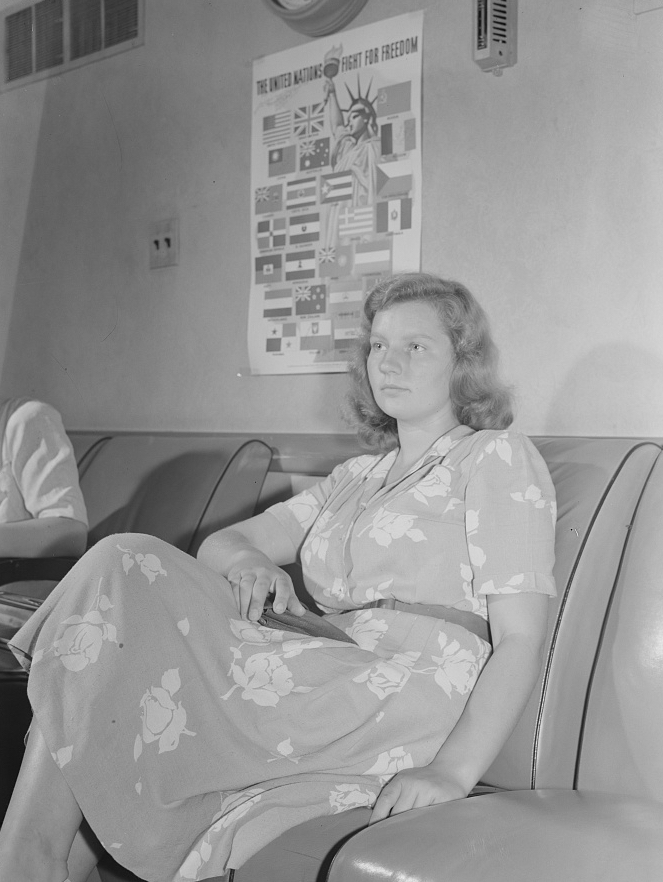
Nichols, Dan, photographer. Washington, D.C. Foreign students at the International Student Assembly [before or after] recording short talks in their native language, to be broadcast by shortwave after censorship by the Office of War Information (OWI), to Nazi-held territory. Sept. 1942. Image. Retrieved from the Library of Congress, http://www.loc.gov/pictures/item/owi2001009784/PP/. (Accessed August 31, 2016.)

Parks, Gordon, photographer. Washington, D.C. International Student Assembly. Wang Yung, a Chinese movie actress, and Corporal Kazimierz Dziedzioch, a delegate from Poland. Sept. 1942. Image. Retrieved from the Library of Congress, https://www.loc.gov/item/owi2001009742/PP/. (Accessed September 01, 2016.)

Parks, Gordon, photographer. Washington, D.C. International Student Assembly. Wang Yung, a Chinese movie actress, and Corporal Kazimierz Dziedzioch, a delegate from Poland. Sept. 1942. Image. Retrieved from the Library of Congress, https://www.loc.gov/item/owi2001009743/PP/. (Accessed August 31, 2016.)

Delano, Jack, photographer. Washington, D.C. International Youth Assembly. Delegate from Poland addressing the assembly. Sept. 1942. Image. Retrieved from the Library of Congress, https://www.loc.gov/item/owi2001009585/PP/. (Accessed August 31, 2016.)

Delano, Jack, photographer. Washington, D.C. International Youth Assembly. General view. Sept, 1942. Image. Retrieved from the Library of Congress, https://www.loc.gov/item/owi2001009843/PP/. (Accessed August 31, 2016.)
Casimir D. Bernard’s daughter, Renee Bernard, posted a comment about her father (Corporal Kazimierz Dziedzioch) on the Cold War Radio Museum Facebook page. She also included his photograph taken when he was in his 80s.
First Lady Eleanor Roosevelt with Soviet Delegates to the International Student Assembly
By the fall of 1942, Poland, Hitler’s and Stalin’s first World War II victim, was no longer as well-regarded in Washington as the new, and much more militarily important anti-German U.S. ally, the Soviet Union, and its leader, Joseph Stalin. President Roosevelt would soon secretly assign Poland to Stalin’s sphere of influence during his wartime summit meetings with Stalin and the British Prime Minister, Winston Churchill, at Tehran and Yalta. FDR would also secretly agree to giving Stalin’s Poland’s eastern territory without informing or getting an agreement from the Polish Government in Exile, which was still a U.S. ally in the war with Hitler’s Germany.
These political decisions by President Roosevelt were behind the Polish students being unable to return to Poland after the war. Most of them became silenced refugees for the rest of their lives in the United States and in other countries where they found refuge from Communism.
I could find no record of Eleanor Roosevelt, meeting with the Polish students attending the International Youth Assembly in Washington, D.C. in September 1942. But the First Lady, who in the summer of 1942 refused a request from Helena Sikorska, the wife of the Polish Prime Minister and a Red Cross volunteer, to appeal directly to Stalin for information about the whereabouts of thousands of Polish military officers, who by then had been already murdered in secret in Katyn and in other locations by the Soviet NKVD security service, did meet with the Soviet delegates to the International Youth Assembly.
The Office of War Information, which in the Voice of America broadcasts promoted the Soviet Katyn lie, also distributed to American and foreign media photographs of Polish, Soviet, and other international students who were invited to the Youth Assembly in Washington.

Delano, Jack, photographer. Washington, D.C. International Youth Assembly. Russian delegates with Mrs. Roosevelt. United States Washington D.C. District of Columbia Washington D.C, 1942. Sept. Photograph. https://www.loc.gov/item/2017835838/.
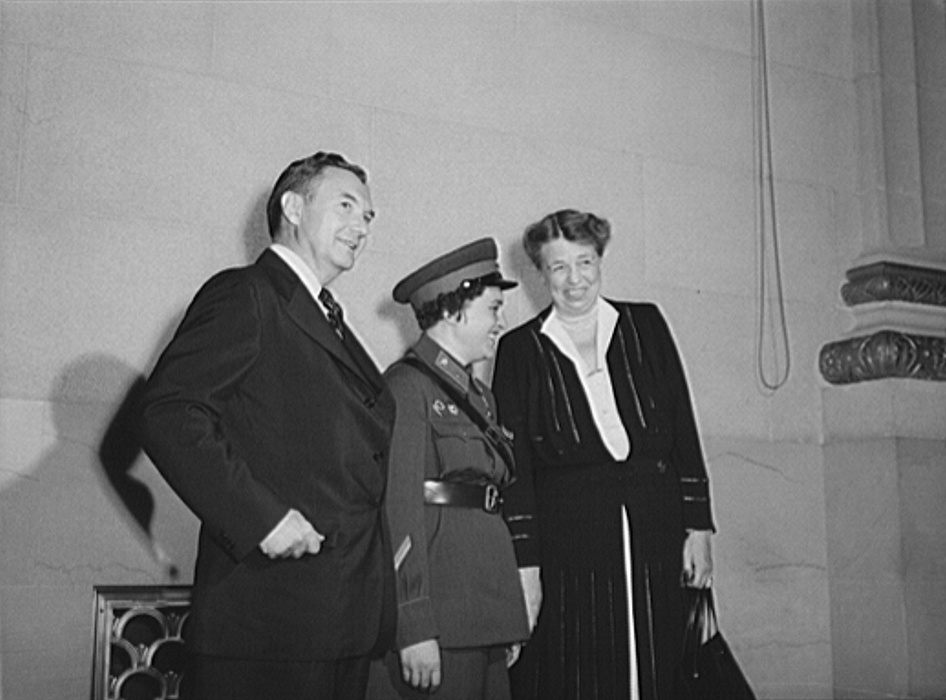
Delano, Jack, photographer. Washington, D.C. International Youth Assembly. Russian delegate with Mrs. Roosevelt and Justice Robert Jackson is Liudmila Pavlichenko. United States Washington D.C. District of Columbia Washington D.C, 1942. Sept. Photograph. https://www.loc.gov/item/2017835840/.
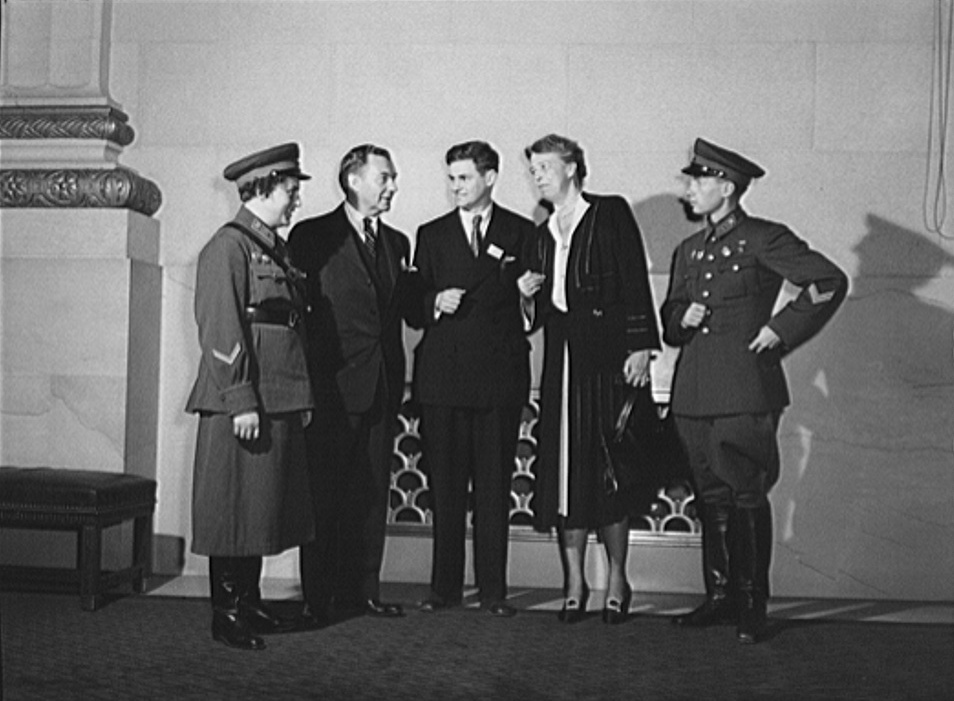
Delano, Jack, photographer. Washington, D.C. International Youth Assembly. Russian delegates with Mrs. Roosevelt and Justice Robert Jackson. United States Washington D.C. District of Columbia Washington D.C, 1942. Sept. Photograph. https://www.loc.gov/item/2017835839/.
President Roosevelt wanted to believe in Stalin’s promises. As Eleanor Roosevelt recalled in her 1949 memoir This I Remember, President Roosevelt believed that “the world was going to be considerably more socialistic after the war.”[ref]Eleanor Roosevelt, This I Remember (New York: Harper & Brothers, 1949), p. 253.[/ref]
Eleanor Roosevelt also wrote with disarming honesty that her husband trusted Stalin when the Soviet leader had told him that the Russians will find themselves “growing nearer to some of your concepts and you may be finding yourselves accepting some of ours” and that he “had a real liking for Marshal Stalin.”[ref]Ibid.[/ref]
In the same book, Eleanor Roosevelt noted that her late husband “enjoyed his first contact with Stalin” at the “Big Three” Teheran conference in late 1943 and thought that Stalin’s “control over the people of his country was unquestionably due to their trust in him and their confidence that he had their good at heart.”[ref]Ibid., p. 316.[/ref]
She also wrote that President Roosevelt “felt that by keeping our word we could build the confidence of this leader [Stalin] whose people, though fighting on our side, still did not trust us completely.”
Eleanor Roosevelt kept in touch with key officials in the Office of War Information and her descriptions of Stalin were similar to how many OWI propagandists viewed the Soviet Union and its leader.
I have often thought that these three men, Stalin, Churchill and Roosevelt, in their very different ways, were extraordinarily good people to have been thrown together to achieve success in this war. All of them, without any question, led their people and gave so unstintingly of their own strength that they inspired confidence and respect.[ref]Ibid.[/ref]
Since Eleanor Roosevelt wrote this in her book published in 1949, it is obvious that neither she nor her husband viewed Stalin as a mass murderer and the completely untrustworthy adversary that he was. In December 1945, President Truman appointed Eleanor Roosevelt as a delegate to the United Nations General Assembly. She played a role in drafting the Universal Declaration of Human Rights. Still, the Polish students, who came to Washington in September 1942, and hundreds of thousands of refugees from Eastern Europe could not return to their home countries ruled by Communists loyal to Stalin and the Soviet Union.
